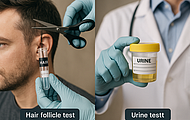How DOT Drug Testing Differs From Non DOT Testing

DOT drug testing is strict. There’s no room for debate or shortcuts. If you’re in transportation, you follow the rules or you’re out. Non-DOT testing gives employers more say, but DOT compliance is black and white. The difference isn’t just about forms. It’s about whether your business keeps moving or grinds to a halt. When companies rely on our DOT drug testing services, they know every step is handled by professionals who understand the stakes.

Who Follows DOT Testing Rules
DOT testing doesn’t cover everyone. It targets roles where a single mistake can put lives at risk. The list is clear:
- CDL drivers behind the wheel of vehicles over 26,001 pounds
- School bus drivers and anyone moving passengers for hire
- Pipeline workers handling hazardous materials
- Maritime crew members on commercial vessels
- Air traffic controllers and flight crews
- Railroad workers in safety-sensitive jobs
Every person in these roles faces the same federal rules. No exceptions. DOT physicals and drug tests go hand in hand. DOT physical requirements set the baseline. Fail to meet them, and you’re off the job. Non-DOT testing covers everyone else. Employers set their own rules, including who gets tested, how often, and what substances matter most. That flexibility helps companies shape their own safety culture, but it also means more decisions and more room for mistakes. Our team helps businesses handle both sets of requirements, so nothing gets missed.
What Gets Tested and How
DOT drug screens stick to a strict formula. Only urine samples count. The test looks for five drug groups:
- Marijuana
- Cocaine
- Amphetamines
- Opioids
- PCP
Every step follows a federal script. The collector checks ID, explains the process, and documents every move. Chain-of-custody forms track the sample from start to finish. No shortcuts. No substitutions. The lab must meet federal certification. Any slip, such as wrong paperwork, missed signature, or improper storage, voids the test. The result doesn’t count. The process starts over, and the clock keeps ticking.
Non-DOT drug screening opens the door to more options. Employers can add substances such as benzodiazepines, barbiturates, synthetic opioids, and more. Testing methods expand too. Saliva, hair, and even blood tests come into play. Non-DOT drug screening adapts to company needs. Some want quick results for pre-employment. Others need long-term detection for ongoing safety. The rules change with each workplace, but the need for clear, consistent procedures never goes away. We help adjust testing panels and methods to fit each business’s unique requirements.
Paperwork and Record-Keeping
DOT testing creates a paper trail that never ends. Every test uses a federal form. Every result gets logged, stored, and protected for years. Auditors can show up at any time. Missing records trigger fines and more oversight. Employers must track:
- Test dates and times
- Employee identification
- Chain-of-custody forms
- Lab certifications
- Final results and follow-up actions
Non-DOT programs can use simpler forms. The paperwork shrinks, but the need for accuracy stays. Business drug testing programs outside DOT rules still need clear records. Disputes over test results, wrongful termination claims, and unemployment hearings all come back to documentation. Sloppy records cost time and money. Clean files protect the company and the employee. Midlands Exams & Drug Screening, Inc supports clients with organized, compliant record-keeping for every test we perform.
What Happens When Rules Get Broken
DOT testing doesn’t forgive mistakes. Refusing a test equals a failed test. The employee leaves safety-sensitive duties immediately. Substance abuse evaluation becomes mandatory. The return-to-duty process drags on with counseling, follow-up tests, and paperwork at every step. The company faces audits, lost contracts, and a reputation hit that doesn’t fade quickly.
Non-DOT programs follow company policy. Some employers remove workers after a failed test. Others offer second chances or require treatment. State laws set the boundaries, but the company decides the details. Workplace drug testing compliance still matters. Corporate drug testing programs must align with state employment laws. Miss a step, and lawsuits follow. The stakes stay high, even without federal oversight.
Why the Differences Matter
DOT testing creates a level playing field. Every driver, pilot, or crew member faces the same process. No one gets special treatment. The rules protect the public and the company. Non-DOT testing gives employers more control, but also more responsibility. The right policy keeps the workplace safe and the business protected. The wrong move, such as unclear rules, inconsistent enforcement, or poor documentation, opens the door to risk.
- DOT testing: rigid, detailed, and unforgiving
- Non-DOT testing: flexible, customizable, but demanding clear policies
- Both require attention to detail and a dedication to fairness
Companies that understand these differences avoid costly mistakes. They keep their teams working and their reputations strong. The paperwork, the protocols, and the follow-up steps all matter. There’s no shortcut to compliance, but there’s also no substitute for a process that works every time.
Schedule Your DOT or Non-DOT Drug Test Today
Midlands Exams & Drug Screening, Inc provides comprehensive DOT and non-DOT testing services that keep your business compliant. Call 803-790-2045 or contact us to schedule testing at our facility.
‹ Back
.png)
.png)






.png)
